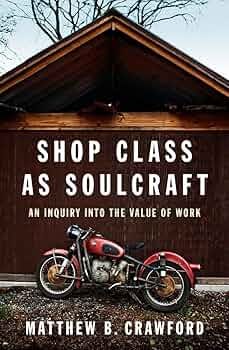Earlier this month, I traveled to a conference to meet one of my favorite writers, Matthew Crawford. Crawford has a PhD in Political Philosophy and is best known for Shop Class as Soulcraft, his meditation on the dignity of manual work, and how trade work—the act of building or fixing something—is inherently character building.
Spending a few days around Crawford put me in the mood to dig back into political classics writers I studied in college, like de Tocqueville and Nietzsche, who wrestled with a question that still shapes our cities today:
Why do some people build while others stand on the sidelines and sneer?
There are a lot of people who hate homebuilders. Or, more specifically, there are a lot of terminally online people who seem obsessed with hating homebuilders.
You see it in every internet comment thread about development, every neighborhood listserv, every “concerned citizens” meeting. Case after case, where builders take risks, their critics frantically engulf civic conversations, moralizing about the heinousness of the act of homebuilding itself.
That became clear in September at a community event hosted by Durham’s Urban Forestry Department. The city’s forester was presenting to the neighborhood on the need to plant more street trees. Durham, he said, was committed to it. There’s even a program that allows homeowners to pay a small fee to have a city-planted street tree installed in front of their house, though participation is dismal.
During the discussion, a friend of mine (a local builder who completes about ten well-designed homes a year) spoke up, interested in the city’s installation goals: “I actually plant street trees on a regular basis.”
The conversation went like this:
Forester: Durham needs more street trees.
Friend: I’ve installed dozens of street trees.
Neighbor: Oh, cool, what do you do for a living?
Friend: I build houses.
Neighbor: Oh gawd.

When I reached out to confirm the facts of the case, the builder told me he’s actually planted more than one hundred street trees in Durham during his career.
Ressentiment
Set aside the irony that the person who builds the city is treated as the villain, and the person who merely complains about building is celebrated as virtuous, and here’s the cold, hard math of this situation:
Number of street trees planted by the local builder: ~100
Number of street trees planted by the people at the meeting who professed to care deeply about street trees: 0
It’s an inversion that thinkers across centuries would recognize. Matthew Crawford explains that this “moral inversion” grows from resentment. He has written extensively on Nietzsche’s (que the French accent) “Ressentiment”:
Ressentiment is set of reflexes that build up around a hard nucleus: the denial of an objective order of good. Ressentiment is thus the psychological expression of nihilism. But the secret genius of ressentiment is that it has generated values of its own -- its own binding morality -- and in doing so turned the world upside down.
Nietzsche saw this moral reversal as the root of resentment itself:
“Nothing is cheaper than blaming others for one’s own weakness.”
That’s why good work is now bad. And bad work is now good. It is an ethic that sees the world as the opposite of what it is, for the emotional benefit of the static seer.
Why do some people see someone building and feel inspired, while others see the same thing and feel accused? Alexis de Tocqueville warned that such envy was “The Democratic Disease” (he intentionally used the definite article). This disease, he said, inevitably resulted in a “soft despotism”, something incredibly evident in my deep-blue hometown of Durham today:
“In democratic ages, envy is a universal feeling.”
In a culture that flattens status, the productive man’s virtue looks like arrogance to the unproductive one. Or, as Ortega y Gasset later put it in The Revolt of the Masses:
“The mediocre man declares the man of excellence to be his enemy.”
Sound familiar?
There’s a lot of noise and dissonance in the world, but building—the actual, physical task of making something—cuts through it. Like every restaurant opened or every piece of art made, every street tree a builder leaves behind is a small act of community building. It is a toast to civilization. And every small act of community building enrages someone who ostensibly wants to build community, but can’t. Political theory gives us language for it, but experience gives us proof.
From my personal experience, I've found that the people who build things don’t need applause. Despite persistent media and political efforts to portray builders as reckless, self-promoting, and self-interested, they are consistently the most humble class of people I know (again, this false narrative is the result of a media-driven moral inversion).
Builders generally don’t go around demanding credit. They have their hands full with lumber, permits, and payroll. But they inevitably leave behind something real, which can be touched, lived in, and shaded under.
Those who fail to build anything (a business, a life, a family, a civic group, a garden, etc.) fill the void with moral superiority. They are the resentful souls Nietzsche diagnosed, the narcissists Crawford identified, the democratic masses that Tocqueville feared.
The philosopher Confucius might have said it best:
“The superior man is modest in his speech, but exceeds in his actions.”
Damn straight. Back here in Durham, my pal doesn’t have a PR firm, or social media accounts, or a ressentiment mob to intimidate others into bending to his will. When he planted his 100 trees, he didn’t do a Facebook post about it. He just went to work, and planted them.
That’s how communities are built.






I leaped, I clapped, I screamed, I exhaled. I feel seen, heard and understood! I love Durham, but I see this moral inversion so deeply. Now doing planning in a smaller rural city, the exact same attitude exists but with less actual awareness and understanding on how things work. It has been the source of my frustration. At least in a very liberal and highly educated community, there is basic understanding of how things work, which complicates the system of these games. And let’s face it, it is a game as well and communal narcissim and resentment.
I’m just so glad I’m not the only one who sees it. I’m in the minority in wanting to solve problems in a fair, honest, balanced, respectful way with intellectual integrity. Too bad it exists in other cities that actually need development to create community and place.
Tocqueville is an eye-opening read.
The masses seem to hate it, but the model of a good king is the one where stuff gets done. When people can get behind a good leader, he gives them what they need. He has the authority to step up to the plate in times of crisis. (see Joseph I Portugal)
We are not getting what we need or want in America. Palisades will show us how dismal the control of the built environment is- nothing like it has happened in history.
Short-sighted totalitarian compliance without logic.